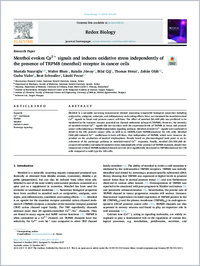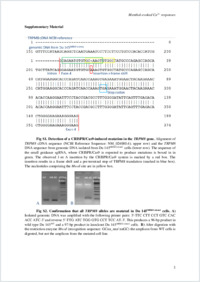Menthol evokes Ca2+ signals and induces oxidative stress independently of the presence of TRPM8 (menthol) receptor in cancer cells
- Nazıroğlu, Mustafa Neuroscience Research Center, Suleyman Demirel University, Isparta, Turkey - Department of Biophysics, Faculty of Mediciene, Suleyman Demirel University, Isparta, Turkey
- Blum, Walter Anatomy, Department of Medicine, University of Fribourg, Switzerland
- Jósvay, Katalin Institute of Biochemistry, Biological Research Center of the Hungarian Academy of Sciences, Szeged, Hungary
- Çiğ, Bilal Department of Biophysics, Faculty of Mediciene, Suleyman Demirel University, Isparta, Turkey
- Henzi, Thomas Anatomy, Department of Medicine, University of Fribourg, Switzerland
- Oláh, Zoltán Institute of Chemistry, Faculty of Materials Science and Engineering, University of Miskolc, Miskolc-Egyetemváros, Hungary - Acheuron Ltd., Szeged, Hungary
- Vizler, Csaba Institute of Biochemistry, Biological Research Center of the Hungarian Academy of Sciences, Szeged, Hungary
- Schwaller, Beat Anatomy, Department of Medicine, University of Fribourg, Switzerland
- Pecze, László Anatomy, Department of Medicine, University of Fribourg, Switzerland
-
01.04.2018
Published in:
- Redox Biology. - 2018, vol. 14, p. 439–449
English
Menthol is a naturally occurring monoterpene alcohol possessing remarkable biological properties including antipruritic, analgesic, antiseptic, anti-inflammatory and cooling effects. Here, we examined the menthol-evoked Ca2+ signals in breast and prostate cancer cell lines. The effect of menthol (50–500µM) was predicted to be mediated by the transient receptor potential ion channel melastatin subtype 8 (TRPM8). However, the intensity of menthol-evoked Ca2+ signals did not correlate with the expression levels of TRPM8 in breast and prostate cancer cells indicating a TRPM8-independent signaling pathway. Menthol-evoked Ca2+ signals were analyzed in detail in Du 145 prostate cancer cells, as well as in CRISPR/Cas9 TRPM8-knockout Du 145 cells. Menthol (500µM) induced Ca2+ oscillations in both cell lines, thus independent of TRPM8, which were however dependent on the production of inositol trisphosphate. Results based on pharmacological tools point to an involvement of the purinergic pathway in menthol-evoked Ca2+ responses. Finally, menthol (50–500µM) decreased cell viability and induced oxidative stress independently of the presence of TRPM8 channels, despite that temperature-evoked TRPM8-mediated inward currents were significantly decreased in TRPM8-knockout Du 145 cells compared to wild type Du 145 cells.
- Faculty
- Faculté des sciences et de médecine
- Department
- Département de Médecine
- Language
-
- English
- Classification
- Biological sciences
- License
-
License undefined
- Identifiers
-
- RERO DOC 306914
- DOI 10.1016/j.redox.2017.10.009
- Persistent URL
- https://folia.unifr.ch/unifr/documents/306511
Other files
Statistics
Document views: 110
File downloads:
- pdf: 230
- Supplementary material: 147

